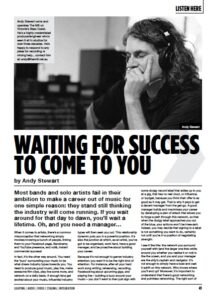News
1 Apr 2019
Waiting For Success To Come To You

Subscribe to CX E-News
Listen Here
Waiting For Success To Come To You
by Andy Stewart.
Most bands and solo artists fail in their ambition to make a career out of music for one simple reason: they stand still thinking the industry will come running. If you wait around for that day to dawn, you’ll wait a lifetime. Oh, and you need a manager…
When it comes to artists, there’s a common misconception that networking simply involves knowing a bunch of people, linking them to your Facebook page, Bandcamp and YouTube presence, and voilà, instant commercial success! In fact, it’s the other way around.
You need the ‘buzz’ surrounding your music to be what draws industry types towards you. You need to produce good music, play live, make awesome film clips, play live some more, and network on a daily basis. If enough fans get excited about your music, influential industry types will then seek you out.
This relationship dynamic puts you in a powerful position. It’s also the junction at which, as an artist, you’ve got to be organised, work hard, have a good manager, and be proactive about building your career. Because it’s not enough to garner industry attention; you want it to be the right kind of attention.
For instance, after all your hard work song writing, rehearsing, recording, Facebooking about upcoming gigs, and playing live – building a buzz around your music – you don’t want to then just sign with some dodgy record label that sidles up to you at a gig, that has no real clout, or influence, or budget, because you think their offer is as good as it may get.
That is why it pays to get a decent manager from the get-go. A good manager builds and maximises your career by developing a plan of attack that allows you to forge a path through this network, so that when the dodgy label approaches you out of the blue, your actions won’t be knee-jerk.
Indeed, you may decide that signing to a label is not something you want to do, certainly not until you’re in a position of negotiating strength.
I see it like this: the network you surround yourself with (and the larger one that orbits around you whether you realise it or not) is like the ocean, and you and your manager are the ship’s captain and navigator. It’s not enough to simply have a boat and cast it adrift on this network. Who knows where you’ll end up? Moreover, it’s important to understand that there’s good networking and pointless networking.
The right sort of networking comes through hanging out with a bunch of like-minded people with whom you share a common interest, like music. The pointless, disingenuous type is where you’re hob-knobbing with people you dislike, only because of what you hope to extract from them one day.
Only the first of these two types is ever effective, almost as an incidental spin-off from the underlying relationship.
Conversely, if you think forging a solid career in the music industry only involves writing songs, recording them, and then sitting there like a fisherman, with your songs as lures waiting for the industry to bite, you’ll wait forever.
You don’t ‘land’ a career in music – it’s not a fish – you forge one.
Get A Manager
As John Watson of Eleven Music (Cold Chisel, Gotyé, Midnight Oil, Silverchair) – Australia’s pre-eminent band manager – once wrote about the role of artist’s managers:
“Most contemporary managers try to build strong networks of friendships in various facets of the music industry, then trade favours with these friends so as to advance the careers of their artists. They constantly spread good news around to motivate other members of the artist’s team to work even harder, and they create detailed and plausible plans, and work hard to make sure everyone sticks to them.”
One of the key points John is making here is the need for an artist to have a highly energised team around them, like spokes on a wheel, with the manager and artist at its hub. It’s this team – this co-ordinated effort – that does the networking.
Without this mechanism in place to focus and drive your band’s agenda, any networking you may do will be at the mercy of the elements, and mostly produce little in the way of career advancement. Unfortunately, these days, too many artists have become convinced that networking has replaced the need for a manager, and that the Internet is just a goldmine waiting to be tapped.
On the contrary, the complexity of the digital landscape makes the management role more crucial than ever. As the interconnectedness of our world grows exponentially, so too does the need for someone to navigate the way forward through this maze on behalf of the artist.
Networking Means What Exactly?
Like the term management, networking means different things to different people.
In the music industry, artists often fall into the trap of believing that a network is a web of random links – people you met at a gig, friends of your producer, fans, that venue owner your brother knows, being Facebook friends with well known industry names – and that once this network grows large enough, superficial though it may be, it will somehow reach critical mass and suddenly you’ll be signed to a huge label. After that, life will be sweet.
But your network isn’t active unless you are. It won’t contact you if you sit there on your hands waiting. You’ve got to use that network to your advantage by working it hard, preferably with a manager who can help co-ordinate the attack.
Without a huge push from you, the phone won’t ring and the messages won’t chime.
Networks are the conduit between the music industry, your fan base, the media and your organisation. They’re not the machine itself – networks represent no-one.
The crucial thing to know about networking – as a band or solo artist – is that making contacts isn’t enough. It’s where the job begins rather than ends. This is where having a manager who can rally the troops (if you or they have any) really makes a difference. Leads are pursued, contacts forged into working relationships – in short, the network is made to serve you.
This is crucial to understand because your network never offers a hand out or free ride, you have to get out there and push it… hard!
Starting Small
The problem with getting a manager of course, let alone a team of troops to network in a co-ordinated, strategic way, starts right at the beginning of your career.
Who do you get, how could you possibly afford to pay them, and how would you know if the one you choose is any good at their job? Moreover, how do you not end up employing someone who’s more interested in his or her own bank balance than yours?
Well, the first things to learn about a manager is that they work for you to earn themselves a living, and they are always – like everyone else – mostly interested in their own bank balance. Take that as a given, not a failing. If you can accept early on that it’s okay for someone to earn money from the work you do, then you’re on the right track.
Unfortunately, too many artists try to go it alone out of some misguided delusion that anyone around them making money off the back of their creative genius must be a leech with mal-intent. This thinking will start you down the path to a small career in the music industry, or no career at all.
The right manager, who will support you when you need support, and who can build a team around you to maximise your career, is the best form of network solution going around. The more you pay them the more loyal they will become.
Two final thoughts… 1: if you sit passively, waiting for a stampede to your door, all
you will see and hear will be people driving past. 2: John Watson emailed me today and made this comment:
“My advice to any artist starting out these days is that you should focus 95% of your energies on the audience and only 5% of your energies on the industry.”
Andy Stewart owns and operates The Mill on Victoria’s Bass Coast. He’s a highly credentialed producer/engineer who’s seen it all in studios for over three decades. He’s happy to respond to any pleas for recording or mixing help… contact him at: andy@themill.net.au
From CX Magazine – March 2019. CX Magazine is Australia and New Zealand’s only publication dedicated to entertainment technology news and issues – available in print and online. Read all editions for free or search our archive www.cxnetwork.com.au
© CX Media
Subscribe
Published monthly since 1991, our famous AV industry magazine is free for download or pay for print. Subscribers also receive CX News, our free weekly email with the latest industry news and jobs.







